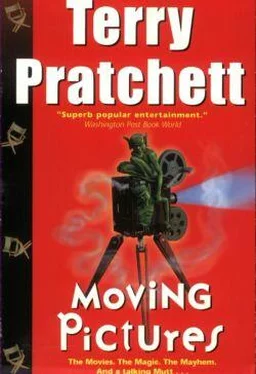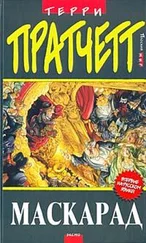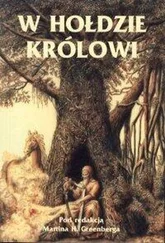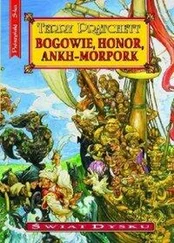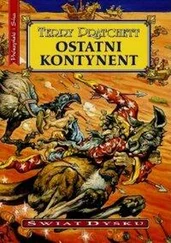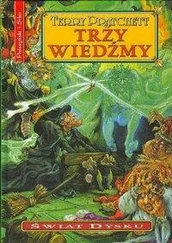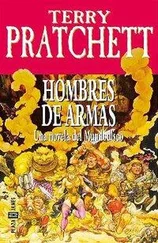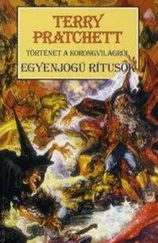As the Archchancellor began to sidle out of the room the Bursar hastily waved a handful of papers at him.
'Before you go, Archchancellor,' he said desperately, 'I wonder if you would just care to sign a few-'
'Not now, man,' snapped the Archchancellor. 'Got to see a man about a horse, what?'
'What?'
'Right.' The door closed.
The Bursar stared at it, and sighed.
Unseen University had had many different kinds of Archchancellor over the years. Big ones, small ones, cunning ones, slightly insane ones, extremely insane ones they'd come, they'd served, in some cases not long enough for anyone to be able to complete the official painting to be hung in the Great Hall, and they'd died. The senior wizard in a world of magic had the same prospects of longterm employment as a pogo stick tester in a minefield.
However, from the Bursar's point of view this didn't really have to matter. The name might change occasionally, but what did matter was that there always was an Archchancellor and the Archchancellor's most important job, as the Bursar saw it, was to sign things, preferably, from the Bursar's point of view, without reading them first.
This one was different. For one thing, he was hardly ever in, except to change out of his muddy clothes. And he shouted at people. Usually at the Bursar.
And yet, at the time, it had seemed a really good idea to elect an Archchancellor who hadn't set foot in the University in forty years.
There had been so much in-fighting between the various orders of wizardry in recent years that, just for once, the senior wizards had agreed that what the University needed was a period of stability, so that they could get on with their scheming and intriguing in peace and quiet for a few months. A search of the records turned up Ridcully the Brown who, after becoming a Seventh Level mage at the incredibly young age of twenty-seven, had quit the University in order to look after his family's estates deep in the country.
He looked ideal.
'Just the chap,' they all said. 'Clean sweep. New broom. A country wizard. Back to the thingumajigs, the roots of wizardry. Jolly old boy with a pipe and twinkly eyes. Sort of chap who can tell one herb from another, roams-the-high-forest-with-every-beast-his-brother kind of thing. Sleeps under the stars, like as not. Knows what the wind is saying, we shouldn't wonder. Got a name for all the trees, you can bank on it. Speaks to the birds, too.'
A messenger had been sent. Ridcully the Brown had sighed, cursed a bit, found his staff in the kitchen garden where it had been supporting a scarecrow, and had set out.
'And if he's any problem,' the wizards had added, in the privacy of their own heads, 'anyone who talks to trees should be no trouble to get rid of.'
And then he'd arrived, and it turned out that Ridcully the Brown did speak to the birds. In fact he shouted at birds, and what he normally shouted was, 'Winged you, yer bastard!'
The beasts of the field and fowls of the air did know Ridcully the Brown. They'd got so good at patternrecognition that, for a radius of about twenty miles around the Ridcully estates, they'd run, hide or in desperate cases attack violently at the mere sight of a pointy hat.
Within twelve hours of arriving, Ridcully had installed a pack of hunting dragons in the butler's pantry, fired his dreadful crossbow at the ravens on the ancient Tower of Art, drunk a dozen bottles of red wine, and rolled off to bed at two in the morning singing a song with words in it that some of the older and more forgetful wizards had to look up.
And then he got up at five o'clock to go duck hunting down in the marshes on the estuary.
And came back complaining that there wasn't a good trout fishin' river for miles. (You couldn't fish in the river Ankh; you had to jump up and down on the hooks even to make them sink.)
And he ordered beer with his breakfast.
And told jokes.
On the other hand, thought the Bursar, at least he didn't interfere with the actual running of the University. Ridcully the Brown wasn't the least interested in running anything except maybe a string of hounds. If you couldn't shoot arrows at it, hunt it or hook it, he couldn't see much point in it.
Beer at breakfast! The Bursar shuddered. Wizards weren't at their best before noon, and breakfast in the Great Hall was a quiet, fragile occasion, broken only by coughs, the quiet shuffling of the servants, and the occasional groan. People shouting for kidneys and black pudding and beer were a new phenomenon.
The only person not terrified of the ghastly man was old Windle Poons, who was one hundred and thirty years old and deaf and, while an expert on ancient magical writings, needed adequate. notice and a good run-up to deal with the present day. He'd managed to absorb the fact that the new Archchancellor was going to be one of those hedgerow-and-dickie-bird chappies, it would take a week or two for him to grasp the change of events, and in the meantime he made polite and civilized conversation based on what little he could remember about Nature and things.
On the lines of:
'I expect it must be a, mm, a change for you, mm, sleeping in a real bed, instead of under the, mm, stars?' And: 'These things, mm, here, are called knives and forks, mm.' And: 'This, mm, green stuff on the scrambled egg, mm, would it be parsley, do you think?'
But since the new Archchancellor never paid much attention to anything anyone said while he was eating, and Poons never noticed that he wasn't getting any answers, they got along quite well.
Anyway, the Bursar had other problems.
The Alchemists, for one thing. You couldn't trust alchemists. They were too serious-minded.
Boom.
And that was the last one. Whole days went by without being punctuated by small explosions. The city settled down again, which was a foolish thing to do.
What the Bursar failed to consider was that no more bangs doesn't mean they've stopped doing it, whatever it is. It just means they're doing it right.
It was midnight. The surf boomed on the beach, and made a phosphorescent glow in the night. Around the ancient hill, though, the sound seemed as dead as if it was arriving through several layers of velvet.
The hole in the sand was quite big now.
If you could put your ear to it, you might think you could hear applause.
It was still midnight. A full moon glided above the smoke and fumes of Ankh-Morpork, thankful that several thousand miles of sky lay between it and them.
The Alchemists' Guildhall was new. It was always new. It had been explosively demolished and rebuilt four times in the last two years, on the last occasion without a lecture and demonstration room in the hope that this might be a helpful move.
On this night a number of muffled figures entered the building in a surreptitious fashion. After a few minutes the lights in a window on the top floor dimmed and went out.
Well, nearly out.
Something was happening up there. A strange flickering filled the window, very briefly. It was followed by a ragged cheering.
And there was a noise. Not a bang this time, but a strange mechanical purring, like a happy cat at the bottom of a tin drum.
It went clickaclickaclickaclicka ... click.
It went on for several minutes, to a background of cheers. And then a voice said:
'That's all, folks.'
'That's all what?' said the Patrician of Ankh-Morpork, next morning.
The man in front of him shivered with fear.
'Don't know, lordship,' he said. 'They wouldn't let me in. They made me wait outside the door, lordship.'
He twisted his forgers together nervously. The Patrician's stare had him pinned. It was a good stare, and one of the things it was good at was making people go on talking when they thought they had finished.
Only the Patrician knew how many spies he had in the city. This particular one was a servant in the Alchemists' Guild. He had once had the misfortune to come up before the Patrician accused of malicious lingering, and had then chosen of his own free will to become a spy. [3] The alternative was choosing of his own free will to be thrown into the scorpion pit.
Читать дальше
